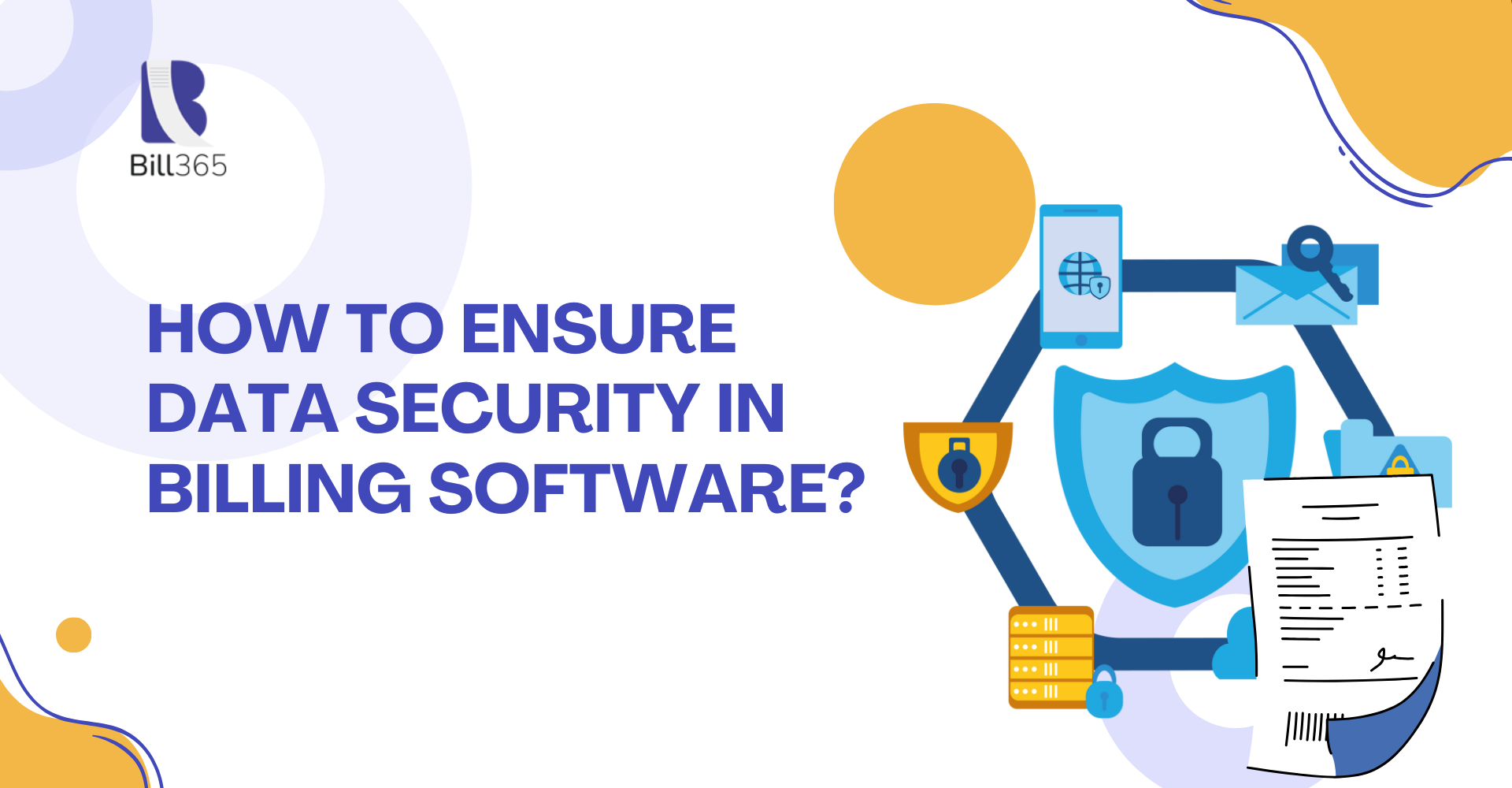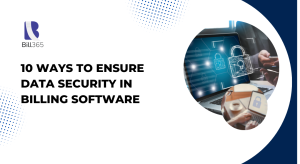
How to Ensure Data Security in Billing Software?
In today’s digital world, data security in billing software has become a critical priority for businesses of all sizes. As more financial transactions are conducted online, the need to protect sensitive data from cyber threats, breaches, and fraud has never been more important. Billing software, which processes confidential customer and business financial information, is a prime target for hackers. A single vulnerability in this system can lead to devastating consequences, including economic loss, damage to reputation, and legal issues.
Ensuring robust data security in billing software is not just about preventing unauthorized access, but also about complying with legal regulations, maintaining customer trust, and safeguarding business operations. This article will explore the various strategies and best practices businesses can implement to enhance data security in their billing software. From choosing the right software to adopting encryption techniques, we will guide you through the essential steps to protect your valuable data. With increasing data threats, businesses must stay ahead of potential risks and adopt proactive measures to secure their billing systems.
Importance of Data Security in Billing Software
Data security in billing software is crucial because it directly impacts the integrity and confidentiality of sensitive financial information. Billing systems handle a wide range of personal and business data, including payment details, billing addresses, and transaction histories. If this data is exposed or compromised, it can lead to severe financial losses, reputational damage, and legal consequences. Businesses that fail to protect this data risk violating data protection regulations such as GDPR or PCI DSS, which can result in heavy fines.
Moreover, ensuring data security in billing software helps build trust with customers. When customers feel confident that their financial information is safe, they are more likely to continue using your services. Data breaches, on the other hand, can tarnish a brand’s reputation and lead to the loss of valuable clientele. With the growing sophistication of cyber threats, companies must prioritize data security in billing software to prevent potential breaches, maintain compliance, and safeguard both customer and business interests.
10 Ways to Ensure Data Security in Billing Software
When using billing software, businesses must be proactivBusinessesata. With increasing cyber threats, ensuring the security of when using billing software the billing process is critical to protect both business and customer information. Here are protecting ential ways to ensure data security in the billing software.

1. Choose Software with Strong Encryption
Encryption plays a vital role in securing sensitive information within billing software. By choosing billing software with robust encryption standards, businesses can ensure that all data—whether it’s a customer’s payment details or transaction history—is securely encrypted during transmission and storage. Strong encryption protects the data from unauthorized access, even if a hacker gains access to the system.
AES (Advanced Encryption Standard) with 256-bit encryption is widely considered one of the most secure encryption methods available. Ensuring that billing software has end-to-end encryption will significantly reduce the risk of data breaches. In addition, it’s important to verify that the software uses encrypted databases to store sensitive customer information securely.
2. Implement Multi-Factor Authentication (MFA)
Multi-factor authentication (MFA) adds an extra layer of security to the billing software login process. This requires users to provide two or more forms of identification before accessing the system, such as a password and a verification code sent to a mobile device. MFA helps prevent unauthorized access, even if a hacker obtains a user’s password.
It ensures that only legitimate users can log into the system, which significantly reduces the risk of identity theft and data breaches. MFA should be implemented for both customers and employees accessing the software. This added security measure helps protect critical financial data from cyberattacks, ensuring the overall security of your billing software.
3. Regular Software Updates and Patches
Keeping your billing software up to date is one of the most important practices to ensure security. Regular software updates and patches from the vendor are essential for fixing security vulnerabilities. Hackers often target outdated software with known weaknesses, and these gaps can be easily exploited.
Businesses can protect against these threats with billing software. Vendors typically release patches to address newly discovered security flaws, so it’s important to implement these updates as soon as they are available. Keeping both the software and its underlying system components updated minimizes the chances of a successful cyberattack and strengthens the overall security framework.
4. Use Secure Payment Gateways
When processing payments through billing software, it’s important to use secure and reliable payment gateways. These gateways should be PCI-DSS compliant and employ strong security measures such as tokenization and encryption to safeguard credit card information during transactions. Tokenization replaces sensitive data, like credit card numbers, with randomly generated tokens, reducing the likelihood of data exposure. A secure payment gateway ensures that both businesses and customers have a safe transaction experience, protecting the integrity of the billing system.
5. Restrict User Access with Role-Based Control
Role-based access control (RBAC) is an effective method to ensure data security by restricting access to sensitive information based on user roles. With RBAC, only authorized users can access specific features and data within the billing software, depending on their assigned role. For instance, an employee in the billing department may have access to payment processing features, while a system administrator can manage user permissions and security settings.
By limiting access to data and functionalities, businesses can minimize the risk of accidental or intentional data leaks. RBAC helps ensure that employees only have the information they need to perform their tasks, reducing potential security risks and ensuring that critical data remains protected.
6. Encrypt Data During Storage
While encrypting data during transmission is crucial, it is equally important to encrypt data during storage. Many businesses overlook the security of stored data, which can be accessed if the system is compromised. Encrypting stored billing data ensures that even if a hacker gains unauthorized access to the database, the information will remain unreadable without the decryption key.
It’s essential to use secure encryption for customer and business financial data. Data should also be encrypted both in transit and at rest, ensuring that it is fully protected, whether it’s being transmitted over a network or stored on a server. This adds an extra layer of security to prevent unauthorized access.
7. Backup Data Regularly
Regular data backups are crucial for ensuring business continuity and security. Having up-to-date backups ensures that critical billing data is not lost in the event of a cyberattack or system failure. Backups should be performed regularly, and the data should be securely stored in an offsite location, either in a cloud-based storage solution or on physical servers.
Regular backup systems help recover lost or corrupted data without compromising business operations. Additionally, encrypted backups provide an extra layer of protection, ensuring that even backup copies of sensitive data are secure. Businesses should test backup processes periodically to ensure their effectiveness during emergencies.
8. Monitor and Audit Access Logs
Monitoring and auditing access logs is a proactive security measure to detect any suspicious or unauthorized activities in the billing software. Keeping track of who accesses the system, when they do, and what actions they take can help identify potential threats before they escalate. Implementing real-time monitoring tools allows administrators to be alerted instantly if an unusual activity or security breach occurs.
Auditing logs can also provide valuable insights into potential weak points in the system and help improve security measures. By regularly reviewing logs and implementing security monitoring tools, businesses can detect and prevent unauthorized access, ensuring the integrity and security of their billing software.
9. Educate Employees on Data Security Best Practices
Employees play a significant role in the overall security of billing software. They need to be educated about the importance of data security and trained to follow best practices. Common security risks, such as phishing emails and weak passwords, can be mitigated through proper training. Employees should be taught to recognize suspicious activities and the proper protocols for handling sensitive data.
Regular security awareness training ensures that employees understand the risks and take appropriate measures to protect customer and business information. Building a security-conscious culture within the organization helps prevent human error, which is often the weakest link in data security, and strengthens the overall protection of billing software.
10. Comply with Security Regulations and Standards
Compliance with security regulations and standards is essential for maintaining the integrity of billing software. Regulations such as GDPR, HIPAA, and PCI DSS outline strict guidelines for data protection, ensuring that businesses adhere to best practices when handling sensitive financial information. Compliance with these standards not only helps protect data but also prevents costly penalties for non-compliance.
Businesses should regularly review and update their security protocols to ensure they meet the latest regulatory requirements. By following these regulations, businesses demonstrate their commitment to protecting customer data and maintaining a secure billing process.
Conclusion
Ensuring data security in billing software is essential for protecting sensitive financial information and maintaining trust with customers. Businesses can significantly reduce the risk of data breaches by implementing practices such as encryption, multi-factor authentication, role-based access, and regular backups.
Monitoring access, educating employees, and complying with security regulations also play key roles in safeguarding data. Prioritizing security not only helps prevent unauthorized access but also ensures business continuity and compliance with legal standards. A robust security strategy creates a safe environment for both businesses and customers, enhancing overall operational stability and confidence.
